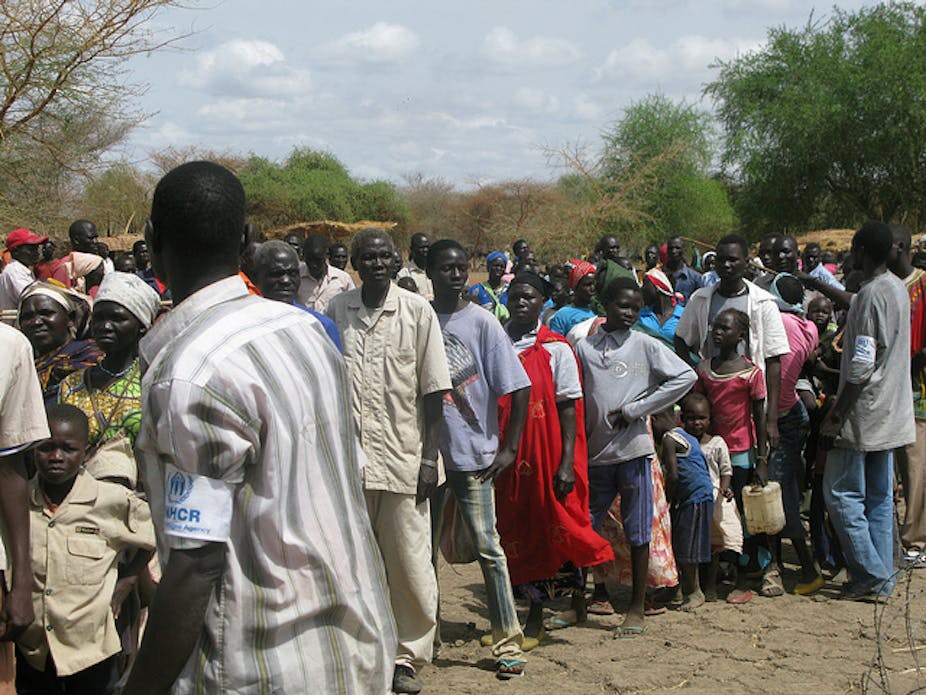The people of Armidale, a NSW country town which benefits from the cosmopolitanism associated with the presence of the University of New England, are tolerant and open-hearted. They might well appear as typical redneck ute drivers to outsiders, but they will raffle tickets for a load of their wood to raise money so that local Sudanese boys can travel interstate for basketball competitions.
Armidale and Canberra are also the only towns in Australia where Nelson Mandela Day is officially celebrated. Many other rural towns have their own ethnic communities and celebrations.
In Armidale, a local non-sectarian NGO has operated a rotating credit fund to pay airfares so that humanitarian entrants who have been living in African refugee camps can resettle and then save up to bring out their relatives.
Now, owing to a government decision which ensures that settlement places for refugees and humanitarian entrants are dribbled out from the same limited quota as for asylum seekers arriving by boat or plane, there have been no recent arrivals from the refugee camps.
One possible solution to Australia’s asylum seeker crisis is to take Armidale’s lead and establish a register for refugees wanting to come to Australia.
How would it work?
The idea is that the Australian government would pay the United Nations High Commissioner for Refugees (UNHCR) to run registration offices for refugee applicants in Indonesia, Malaysia and Thailand, for example. The UNHCR would be given clear guidelines to distinguish between individuals at risk of persecution and members of disadvantaged groups, not all of whom are persecuted.
Once registered, these refugees would go on a database which would be publicly available on the web with a photograph and 200-word description of the individual (with sketches and pseudonyms where necessary).
Each adult Australian citizen would have the right to sponsor one person selected from the register every five years upon payment of a A$5,000 fee as earnest of their seriousness in sponsorship. Families, NGOs, churches and non-Christian groups would be able to co-ordinate together to fundraise and bring in family groups.
Once provisionally sponsored, Australian health and security checks would be carried out before boarding the plane to Australia.
On arrival, the sponsored persons would have the right to work, to become tax-payers and to access Australian benefits. The cost of this would be balanced by the massive savings made by closing down detention centres in Australia and on Pacific Islands.

Fairness and generosity
Almost inevitably, English speakers and members of groups with receptive communities already established here in Australia would have an advantage, but no scheme will ever be 100% fair. The biases in this scheme would be in favour of attributes helpful in later settlement.
Except for non-refugees, this register would beat the people smugglers by offering a kinder alternative. No-one would be able to say that Australians had not chosen these new residents.
Furthermore, if all Australians, even the one in four born overseas, are as stony-hearted as our politicians allege the much-maligned residents of western Sydney to be, then there would be very few entrants under such a scheme. The numbers coming would be a direct measure of Australians’ generosity of spirit which I would rank much higher than that of the politicians currently so keenly racing each other to the bottom.
In any case, each and every arriving refugee would have at least one Australian to sincerely welcome them. Even Japan, with its xenophobic past, used to have a scheme under which each Japanese aid worker abroad had the right to bring back with them one local to be trained in Japan.
What about those who are left out?
If a register scheme were to be implemented, it would leave two outstanding questions. What would happen to refugees on the register whom no Australian wants to sponsor? What also would happen to asylum seekers who are found not to be refugees: members of unpopular minorities who aren’t at risk of persecution if returned home, as is currently the case with some Sri Lankan Tamils and better-off Iranians?
As to the “unwanted”, hope springs eternal, and at least they would be no worse off than before. As to the asylum seekers found to be self-selected economic migrants (as opposed to the 190,000 officially selected economic migrants and family members welcomed in Australia by our government last year), they would be flown home with a folder of information on the qualifications and other requirements necessary before they could be accepted as visaed immigrants.
Meanwhile, we in the bush can only dream that the next government might have the vision, as did former prime minister Malcolm Fraser with the Vietnamese, to let digger hospitality to those down on their luck shine through. By definition asylum seekers are brave and enterprising individuals – why not welcome them?

